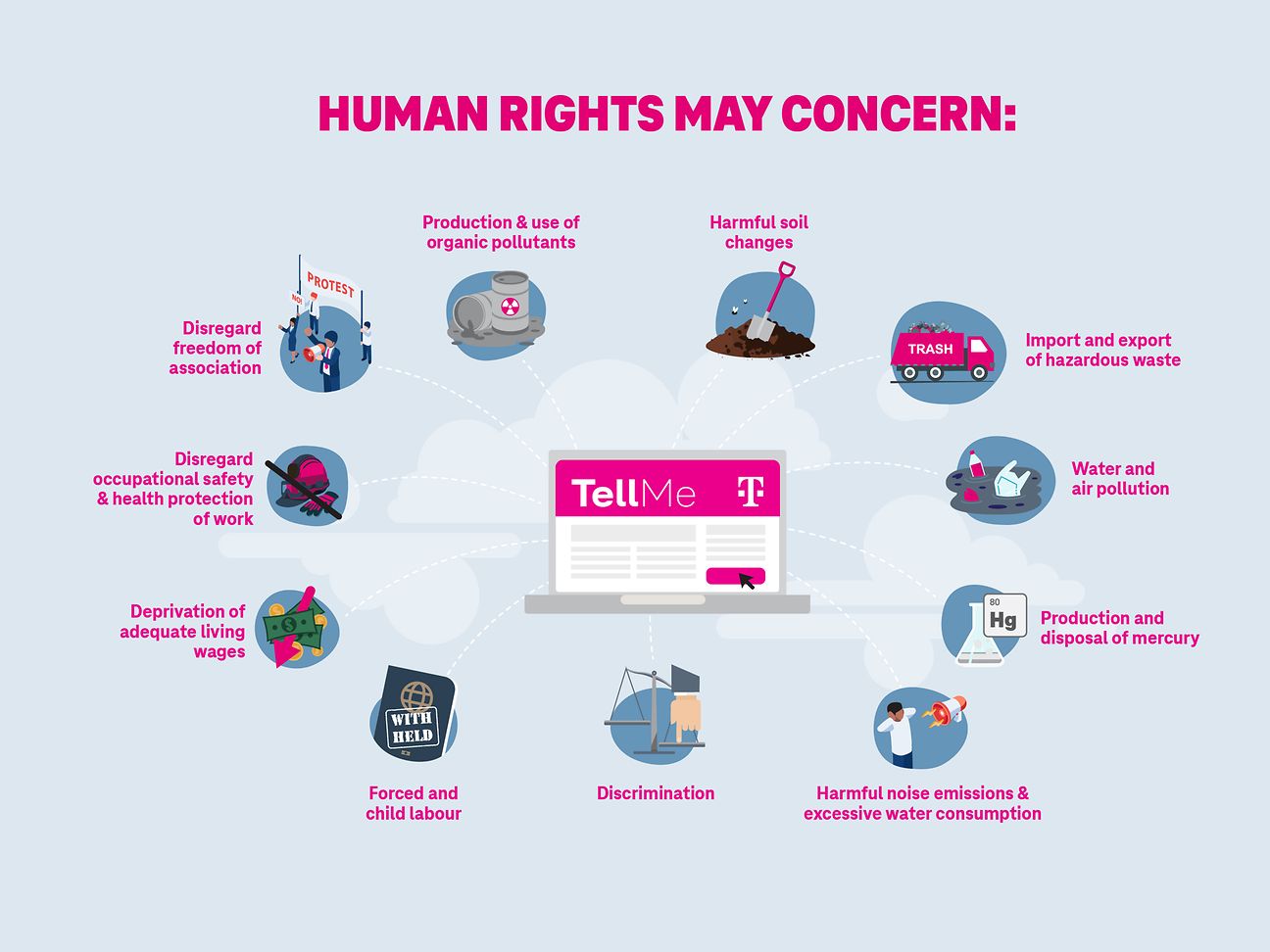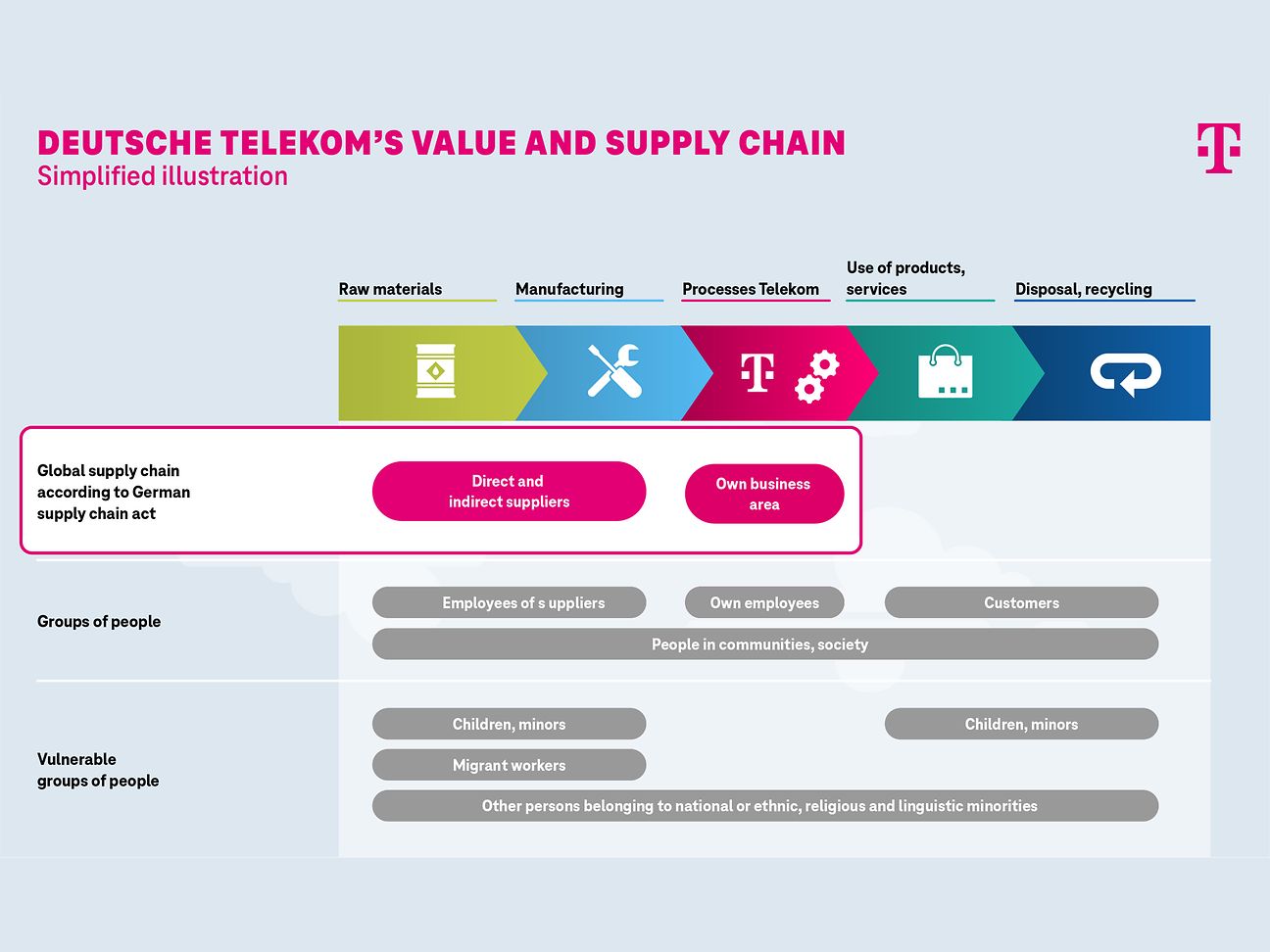Human rights are non-negotiable
Our commitment: Deutsche Telekom undertakes to respect and promote human rights and environmental regulations everywhere that we are active; this includes our supply chains and business partners.
We specify this commitment in detail in our policy statement on human rights. We are guided throughout by laws such as the Act on Corporate Due Diligence in Supply Chains (LkSG), as well as by international reference frameworks on human rights and the environment, such as the United Nations’ Universal Declaration of Human Rights, the International Labour Organization’s core labor standards, the OECD’s Guidelines for Multinational Enterprises, and many more besides.
Our policy statement on human rights
Our principles on human rights and the environment underpin all of our business activities. These principles apply in equal measure to our employees, our suppliers, and our business partners, and are defined in our global Code of Human Rights (pdf, 203.7 KB) (=Part 1 of our policy statement on human rights).
They describe our values, standards, and fundamental due diligence processes, which are firmed up in further intragroup policies, practices, and processes, and provide the framework for our actions. We continually further develop these aspects and report annually on our work in this area.
This Code of Human Rights is adopted and implemented by all Group companies over which Deutsche Telekom exercises a decisive influence. More than one hundred Group companies worldwide act in alignment with these principles on human rights and the environment.
Moreover, every year we publish information within our “Annual report LkSG” on internally defined human rights-related and environmental risks from the previous year, including the resulting measures and expectations (=Part 2 of our policy statement on human rights).
What are human rights?
We are all affected by human rights: All humans are entitled to human rights – at all times and everywhere, without distinction of any kind, such as race, color, sex, language, religion, political or other opinion, national or social origin, property, birth or other status (Universal Declaration of Human Rights, Article 2).
Examples of human rights are
- Prohibition of discrimination (e.g., on the basis of age, gender, religion, etc.),
- Prohibition of child labor,
- The right to freedom from torture and forced labor,
- The right to freedom of speech,
- The right to an adequate living wage,
- The right to work and to health protection,
- The right to a healthy environment.
To help bring an even sharper focus to our commitment to respecting human rights, we have identified specific groups of people on whom our business activities could potentially have a negative or positive impact.
Groups of people and the value chain
Our business activities could have a positive or negative impact in particular on the following groups of people: employees of our Group companies and of our direct or indirect supplier companies, individuals from our customer base, and people in communities.
We are careful to pay particular attention to vulnerable groups of people, for instance, children, young people, women, migrant workers, and other persons belonging to national or ethnic, religious and linguistic minorities. Since the focal points of human rights concerns can shift throughout the evolution of a company, we review them at least once a year and make adjustments where necessary.
All of the business activities that are necessary for producing our products and services and delivering them to customers can be broken down into various phases, which are illustrated in our global value chain. This simplified presentation explains in which phase we directly or indirectly contribute to the root cause of any risks and enables us to take preventative action in order of priority. The above-mentioned groups of people can be positively or negatively affected by our direct and indirect business activities in any of these phases.
Our global value chain begins in the first phase with the extraction of raw materials, followed by phase two – production – in which these materials undergo processing. Phase three – finishing – takes place within our own Group companies to create the products and/or services which are then delivered to our customers. These three phases also encompass the supply chain within the meaning of the German Supply Chain Act (LkSG). The final two phases of the global value chain, phases four and five, relate to the recycling and disposal of products.
We proactively work to prevent risks and violations from occurring by implementing risk management mechanisms. If, despite these mechanisms, a violation or suspected violation occurs, we have put in place the whistleblower portal TellMe, a notification -procedure with dedicated communication channels that can be used by anyone, irrespective of whether they are affected personally.

